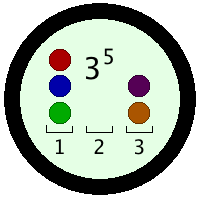As detailed on the syllabus, your content grade in this course will be determined by your proficiency on a variety of standards. (This is known as Standards Based Grading.)
The list of standards will grow throughout the semester.
Standards
Standard 1. Basic Counting. Can you apply basic counting techniques involving words and sets with and without repetition? Can you apply the sum and product principles?
Standard 2. Counting the complement. Can you apply the counting technique of counting the complement? Can you determine and count the universe and the complement in order to count a set?
Standard 3. Finding a bijection. Given two sets A and B, can you determine a rule/function that pairs the elements of A and B in such a way that this rule/function generalizes to an infinite family of sets?
Standard 4. Proving a bijection. Given a function between sets A and B, can you prove that the function is a bijection?
Standard 5. Applying the equivalence principle. Can you prove that a relation is an equivalence relation? Do you know when the equivalence principle applies? Can you apply the equivalence principle?
Standard 6. Combinatorial Proof. Can you prove an identity using a combinatorial proof? This includes the square-domino interpretations of the Fibonacci numbers.
Standard 7. Counting Distributions. Can you answer a question involving distributing objects into boxes and/or equivalent counting questions?
Standard 8. Principle of Inclusion / Exclusion. Can you apply the principle of inclusion / exclusion? Given a problem, can you determine the sets that are being intersected?
Standard 9. Generating Function Determination. Given an integer sequence defined by a recurrence relation or as counting a set of discrete objects, can you determine the closed form for its generating function?
Standard 9. Coefficient Extraction. Given a generating function in its closed form, can you extract the necessary coefficient?
Standard 10. Combinatorics of Generating Functions. Can you interpret generating function multiplication, powers, and compositions combinatorially?
Standard 11. Generating Function for Partitions. Can you interpret the generating function for partitions? Can you its generating function to prove partition identities?
Standard 12. Ferrers/Young Diagrams for Partitions. Do you understand how Ferrers diagrams and Young diagrams represent partitions? Can you use them in combinatorial proofs related to partitions?
Standard 13. Catalan numbers. Do you know the Catalan numbers? Can you apply the bijections between the combinatorial interpretations we discussed in class?
Standard 14. The generating function of Catalan numbers. Do you know the generating function C(x) for Catalan numbers? Can you explain how it arises combinatorially from a combinatorial interpretation of the Catalan numbers?
Standard 15. Permutations Statistics. Can you apply the descent statistic, inversion statistic, and major statistic to a given permutation?
Standard 16. q-analogs. Do you understand the concept of a q-analog? Do you know [n]q, the q-factorial, and the q-binomial coefficients?
